Non-fiction
Non-fiction
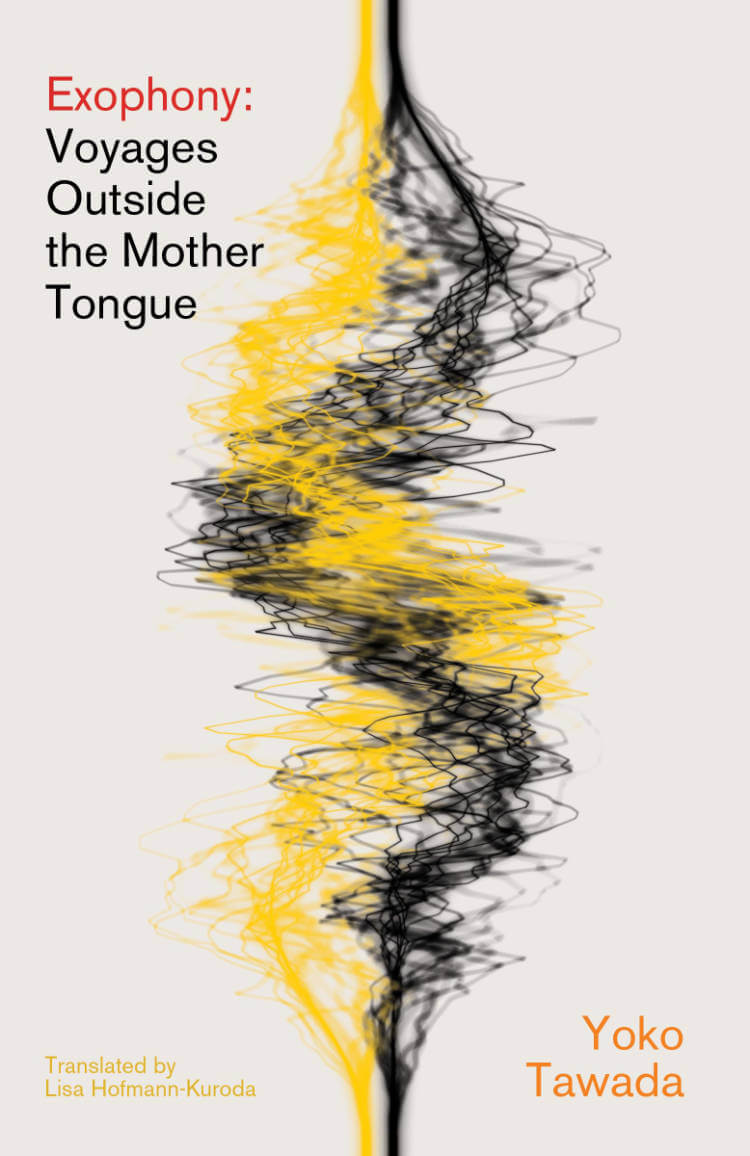
Exophony
Yoko Tawada's first essay collection in English presents and electrifying new side of the National Book Award-winner as she dives deep into her lifelong fascination with cross-hybridizing languages. The accent here, as in her fiction, is on the art of drawing closer to the world through defamiliarization. Tawada famously writes in both Japanese and German, but her interest in language reached beyond any mere dichotomy.
The term "exophonic," which she first heard in Senegal, has a special allure for the author: "I was already familiar with similar terms. 'immigrant literature,' or 'creole literature,' but 'exophonic' had a much broader meaning, referring to the general experience of existing outside of one's mother tongue." Exophony opens a new vista into Yoko Tawada's world and delivers more of her signature erudite wit—at once cross-grained and generous, laser-focused and multidimensional, slyly ironic and warmly companionable.
A New Yorker Best Book of 2025. Translated from Japanese by Lisa Hofmann-Kuroda.

A Map of Absence: An Anthology of Palestinian Writing on the Nakba
A Map of Absence presents the finest poetry and prose by Palestinian writers over the last seventy years. Featuring writers in the diaspora and those living under occupation, these striking entries pay testament to one of the most pivotal events in modern history – the 1948 Nakba.
This unique, landmark anthology includes translated excerpts of works by major authors such as Mahmoud Darwish, Ghassan Kanafani and Fadwa Tuqan alongside those of emerging writers, published here in English for the first time. Depicting the varied aspects of Palestinian life both before and after 1948, their writings highlight the ongoing resonances of the Nakba.
An intimate companion for all lovers of world literature, A Map of Absence reveals the depth and breadth of Palestinian writing.
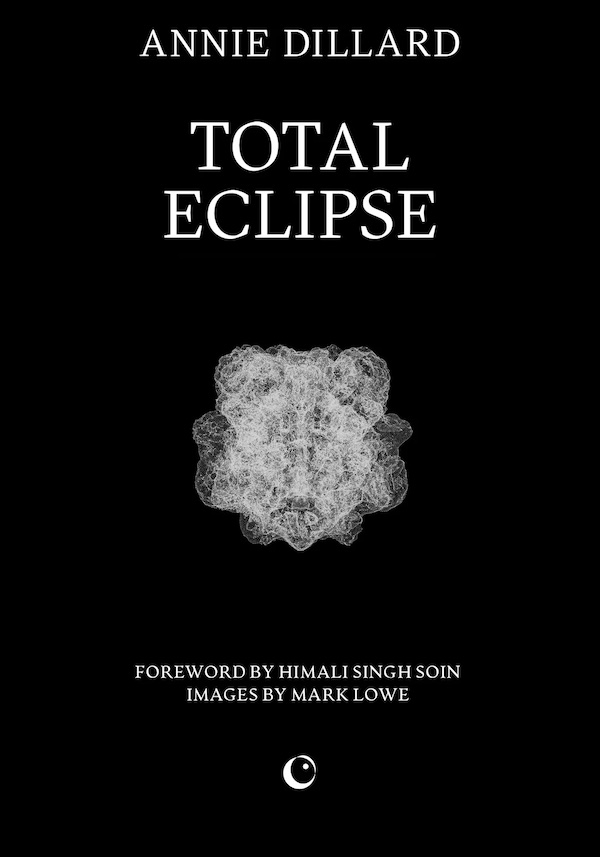
Total Eclipse
What can we know, and what remains beyond our reach?
In 1979, Annie Dillard witnessed the solar eclipse in Yakima, Washington. In Total Eclipse this celestial event becomes a metaphysical reckoning. With lyrical precision and eerie clarity, Dillard unforgettably evokes the strangeness of the shifting sky and the psychic dislocation that descends with the shadow.
The quiet yet epic unravelling of the familiar becomes revelation: a rupture in time, a confrontation with mortality and a brush with the sublime. Juxtaposing the cosmic and the mundane, Total Eclipse meditates on the limits of perception and language, entering the surreal intensity of the phenomenon to emerge with the brief, blazing clarity offered by darkness.
Foreword by Himali Singh Soin
Images by Mark Lowe
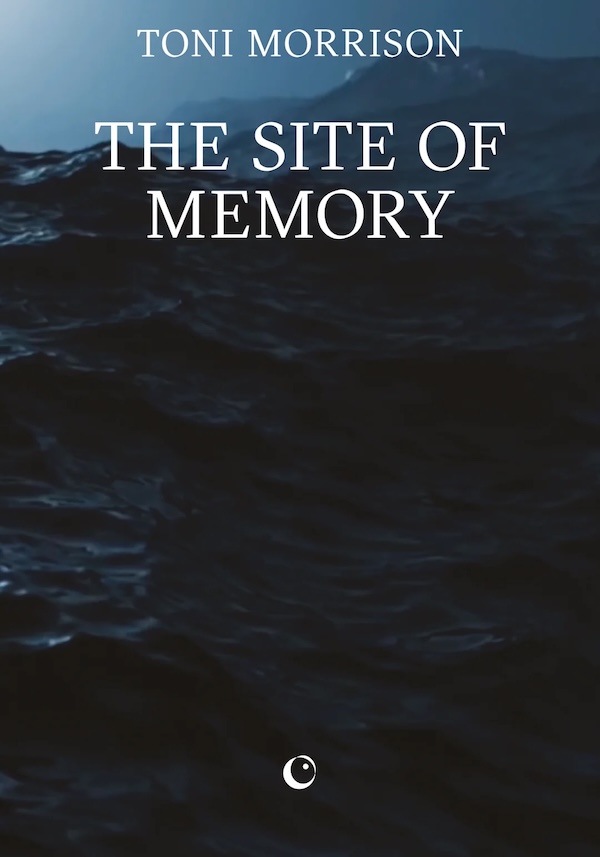
The Site of Memory
All water has a perfect memory and is forever trying to get back to where it was. Writers are like that: remembering where we were, what valley we ran through, what the banks were like, the light that was there and the route back to our original place.
The Site of Memory describes Toni Morrison’s work of literary archaeology. She offers insights into how she arrives at a text through the act of imagination bound up with memory and shows how she explores two worlds – the actual and the possible – via the nimbus of emotion surrounding the journey of an image: from picture to meaning to text.
Exploring the radical possibilities of literature and the limits of history, Morrison finds a truth deeper than documentation in the silences and omissions in African American narratives of the past. Fiction, for Morrison, is a practice of ethical restoration: a means to recover what history has neglected through the ‘flooding’ of a rush of imagination. In The Site of Memory, ancestral presence, emotion and imagination converge.
If writing is thinking and discovery and selection and order and meaning, it is also awe and reverence and mystery and magic.
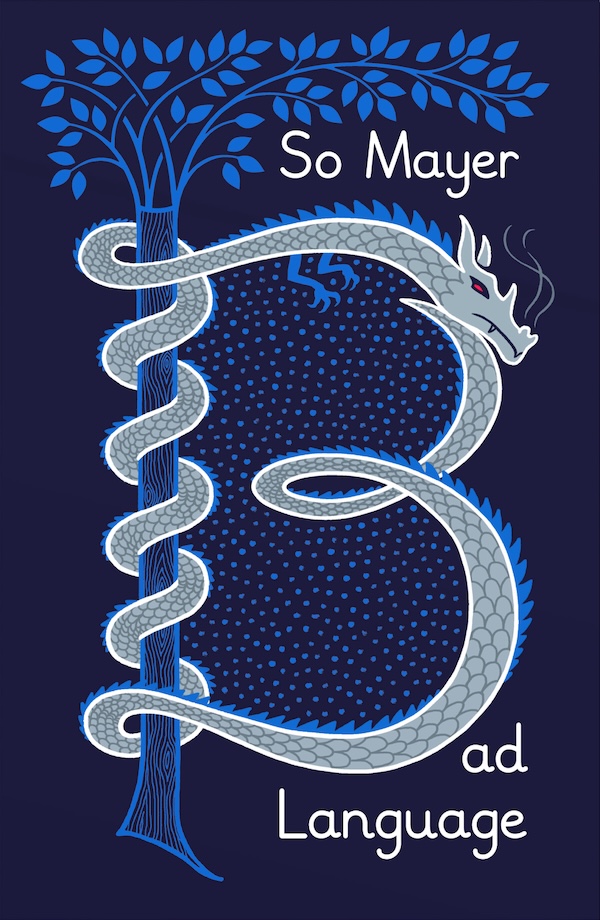
Bad Language
There is no such thing as a safe word.
In Bad Language, So Mayer blends memoir and manifesto as they explore the politics of speech, while looking at how language has been used – and abused – in their own life. What is the relationship between language and sexual violence? And how can we ‘make ourselves up’ in language when words themselves are encoded by a dominant culture that insists we see ourselves as powerless listeners rather than active speakers?
Examining the semantic traps of their multi-lingual childhood – and taking in texts from the Torah to Grimms’ Fairytales, from protest bust cards to the works of Ursula K. Le Guin – Mayer asks who gets to speak, and who is forced into silence. Bad Language calls out the harm that words can do, while searching for crafty ways through which we can collectively reclaim language for protest and pleasure.
‘Mayer’s writing is generous, astute and sincere; in Bad Language, they choose their words carefully, using incantation and spell to distil a complex argument – the transformative power of language lay in its ability to shape sense perception. For Mayer, the task of ‘making ourselves up’ is another way of asking, what kind of world do we want to live in?’ – Lola Olufemi
SO MAYER is a writer, editor, bookseller and organiser. Truth & Dare, their first collection of speculative fiction, was longlisted for the Republic of Consciousness and Edge Hill Short Story prizes. With Sarah Shin, they co-edited Ursula K. Le Guin, Space Crone, winner of the 2024 Locus Award for non-fiction. Bad Language is their second book for Peninsula, after A Nazi Word for a Nazi Thing.

Studies on Squats
Studies on Squats is an evocative exploration of embodied resistance and political movement that uses the multifaceted posture of the “Asian Squat” as a lens through which broader concepts of migration, illness, and resilience are examined. In Studies on Squats, the body—in its most vulnerable and potent states—becomes a speculative site for reclaiming agency by crafting new forms of protest that draw from ancestral strength, humor and eroticism. This posture, rich with cultural resonance, offers as an entry point to imagine ways in which the body can engage in acts of defiance against systems of oppression. Studies on Squats invites the audience to consider how dance and choreographic thinking can serve as tools for envisioning alternative futures, where artistry empowers those enduring systemic social injustices to transform their realities.

All Ah We is One: Caribbean Carnival Costume
Caribbean Carnivals have been taking place around the UK since 1959. These joyous celebrations of culture and community began as acts of resistance in the face of enslavement — a defiant stand from communities who refused to lose who they were and where they came from.
Drawing from this rich and radical history, Aisling Serrant explores Carnival through one of its most vibrant and unmissable features: costume. First turned to by former slaves in the Caribbean as an act of reclamation and quiet resistance, with roots in West African and European masquerade alike, the colourful costumes of Carnival weekend remain a vital mode of self-expression, protest, and camaraderie. From Canboulay to Leeds and Notting Hill, the costume makers, wearers, and the communities they attract, embody Carnival in the spirit of an expression used across the Caribbean to signify unity among nations and peoples: all ah we is one.

The Lesbian Body
In this genre- and gender-breaking work of theory-fiction, legendary writer and cofounder of the 1970s French feminist movement Monique Wittig celebrates the body—lesbian, literary and defiantly political—and challenges the order of heterosexuality in literature.
First published in French in 1973, The Lesbian Body mines the relationship between a lover and a beloved—also a writer and a text—to explore the ideological and historical constructions of the female subject. Organized according to the principle of montage, poetic passages are juxtaposed with anatomic lists that mark lesbian eros. Through expressions of joy, violence, and tenderness, the site of pleasure is celebrated. In her transfiguration of gender and its paradigms, Wittig transformed French vocabulary, feminizing grammar and lesbianizing myths. This edition brings the English translation of Wittig’s groundbreaking work back into circulation for the first time since the mid-1980s, revised according to the author's notes, and with an introduction by Paul B. Preciado.
“The Lesbian Body is a fundamental work of lesbian existence. Wittig's applied vision is a state of natural delirium, a revolutionary excess of utopianism, refusal, and mutual self-creation. Revisiting it reveals how much passionate free thought has been lost, and simultaneously, how many of her tropes and discoveries have integrated into our collective consciousness.” — Sarah Schulman
“In this stunning new rendering of The Lesbian Body by the French author, theorist, activist and teacher, the late Monique Wittig, we are plunged into an imagined world of passionate violence and erotic lesbian mayhem intertwined in strikingly bold poetic images. Wittig, in the reach and volatility of her imagination, stands alongside such important American writers as Audre Lorde, Adrienne Rich, and Valerie Solanas, all of whose work deserves to be read again, or for the first time.” — Esther Newton
“To read the book is to be forced by Wittig into another grammar and happily contaminated by its strange forms. You will never think straight again.” — Jack Halberstam
“For me, Wittig opened up a sense of the world that had been, quite literally, unimaginable. She tore us apart.” — Judith Butler
“Together with Ursula Le Guin and Samuel R. Delany, Wittig is the first to design a nonbinary utopia, a world in which the binary categorization of sexes and genders will have ceased to exist.” — Paul B. Preciado
Introduction by Paul B. Preciado
Translated by David Le Vay
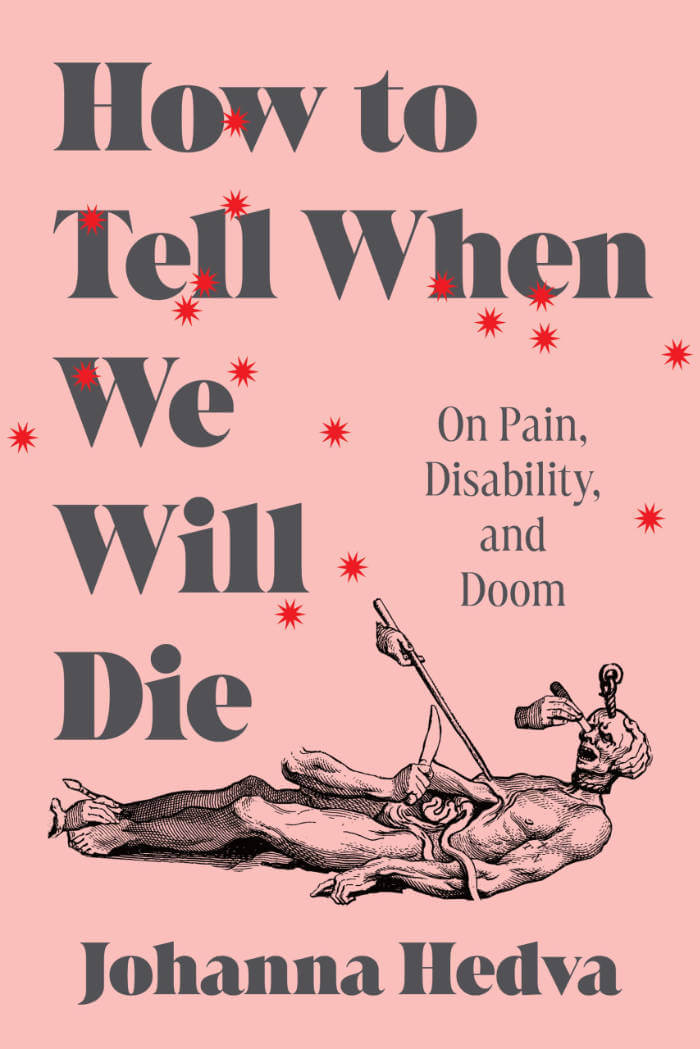
How to Tell When We Will Die: On Pain, Disability, and Doom
The long-awaited essay collection from one of the most influential voices in disability activism that detonates a bomb in our collective understanding of care and illness, showing us that sickness is a fact of life.
In the wake of the 2014 Ferguson riots, and sick with a chronic condition that rendered them housebound, Johanna Hedva turned to the page to How do you throw a brick through the window of a bank if you can’t get out of bed? It was not long before this essay, “Sick Woman Theory”, became a seminal work on disability, because in reframing illness as not just a biological experience but a social one, Hedva argues that under capitalism—a system that limits our worth to the productivity of our bodies—we must reach for the revolutionary act of caring for ourselves and others.
How to Tell When We Will Die expands upon Hedva’s paradigm-shifting perspective in a series of slyly subversive and razor-sharp essays that range from the theoretical to the personal—from Deborah Levy and Susan Sontag to wrestling, kink, mysticism, death, and the color yellow. Drawing from their experiences with America’s byzantine healthcare system, and considering archetypes they call The Psychotic Woman, The Freak, and The Hag in Charge, Hedva offers a bracing indictment of the politics that exploit sickness—relying on and fueling ableism—to the detriment of us all.
With the insight of Anne Boyer’s The Undying and Leslie Jamison’s The Empathy Exams, and the wit of Samantha Irby, Hedva’s debut collection upends our collective understanding of disability. In their radical reimagining of a world where care and pain are symbiotic, and our bodies are allowed to live free and well, Hedva implores us to remember that illness is neither an inconvenience or inevitability, but an enlivening and elemental part of being alive.
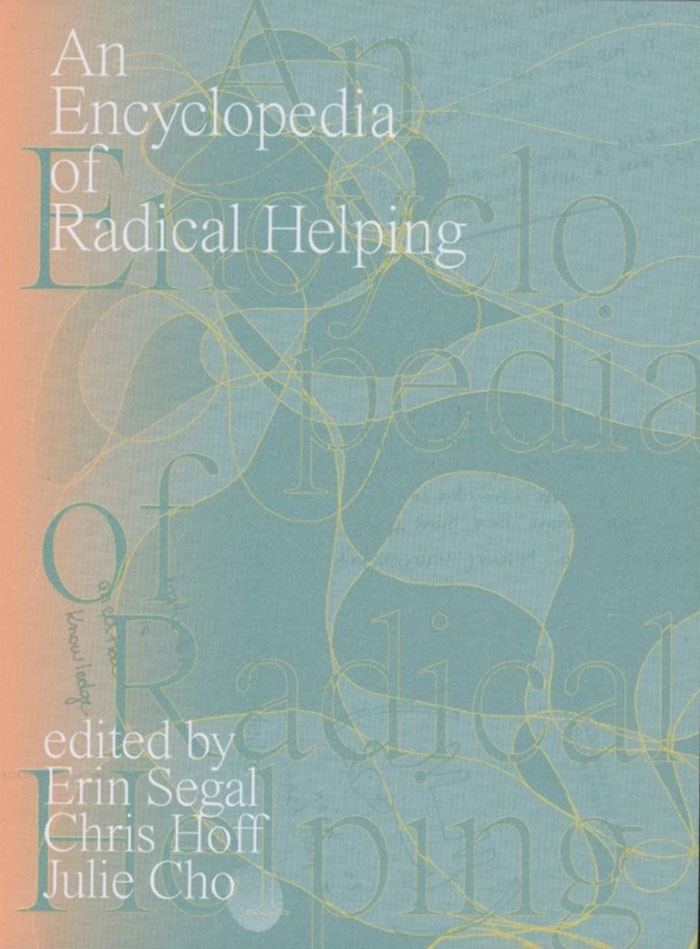
An Encyclopedia of Radical Helping
Erin Segal, Chris Hoff and 1 more
From “abundance” to “zinemaking,” An Encyclopedia of Radical Helping* invites the reader to wander through a collection of interconnected entries on helping and healing by over 200 contributors from the worlds of social work and family therapy; art and design; body work; organizing; and more. Privileging co-construction over diagnosis, wisdom over evidence, collective healing over individual cure–yet always blurring categories and embracing contradictions–this world-making collection reveals a pluriverse of helping practices grounded in love and freedom.
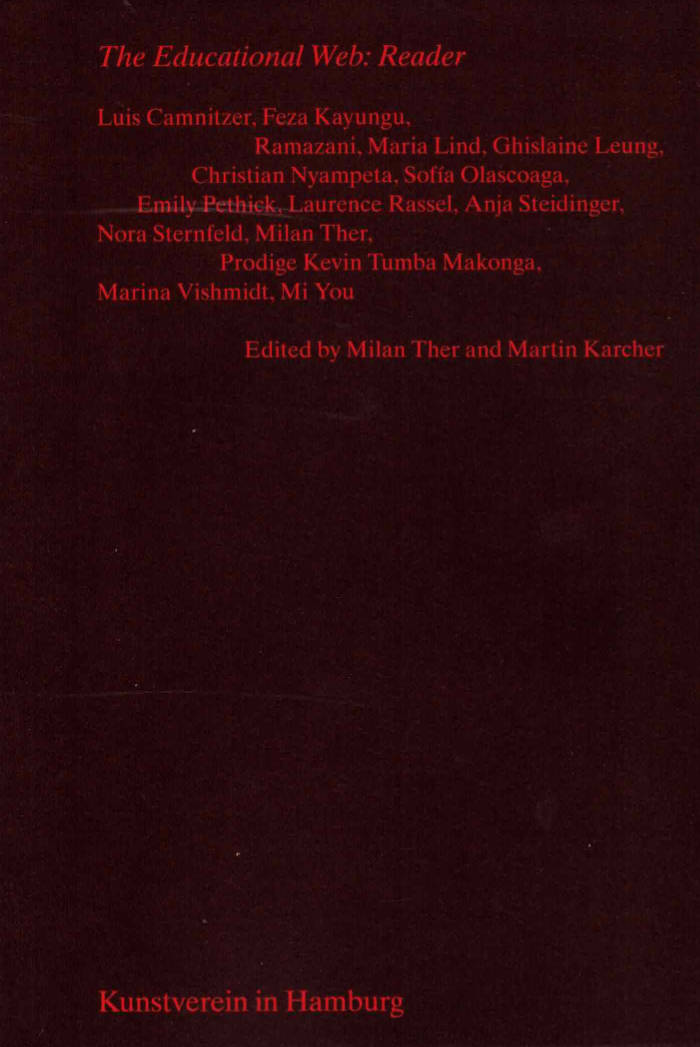
The Educational Web: Reader
A reader documenting the exhibition and symposium on eight schools, educational organisations and independent, self-organised educational programmes which see themselves as alternatives to traditional art academies and currently occupy central positions in the field of contemporary art.
The Educational Web: Reader brought together eight schools, educational organisations and independent, self-organised educational programmes at the Kunstverein in Hamburg. Often with a strong theoretical orientation, each of the programmes can be understood as a space for learning, a network and a community that does not rely on traditional curricula, but is organised around a form of immediacy and the relationship between artistic practice and local context. The programmes were invited to exhibit their own pedagogical approaches, resulting in an exploration of the interface between pedagogy, artistic practice and curatorial work.
Artists, researchers, and educators came together for the symposium on 1 and 2 July 2023 to articulate and reflect on recent developments in artist-initiated pedagogy and institutional practice. The symposium continued the questions raised by the exhibition and was expanded by a series of contributions, which are now collected for the first time in revised form in this volume, The Educational Web: Reader.
Texts by Luis Camnitzer, Feza Kayungu Ramazani, Maria Lind, Ghislaine Leung, Christian Nyampeta, Sofía Olascoaga, Emily Pethick, Laurence Rassel, Anja Steidinger, Nora Sternfeld, Prodige Kevin Tumba Makonga, Marina Vishmidt, Mi You.
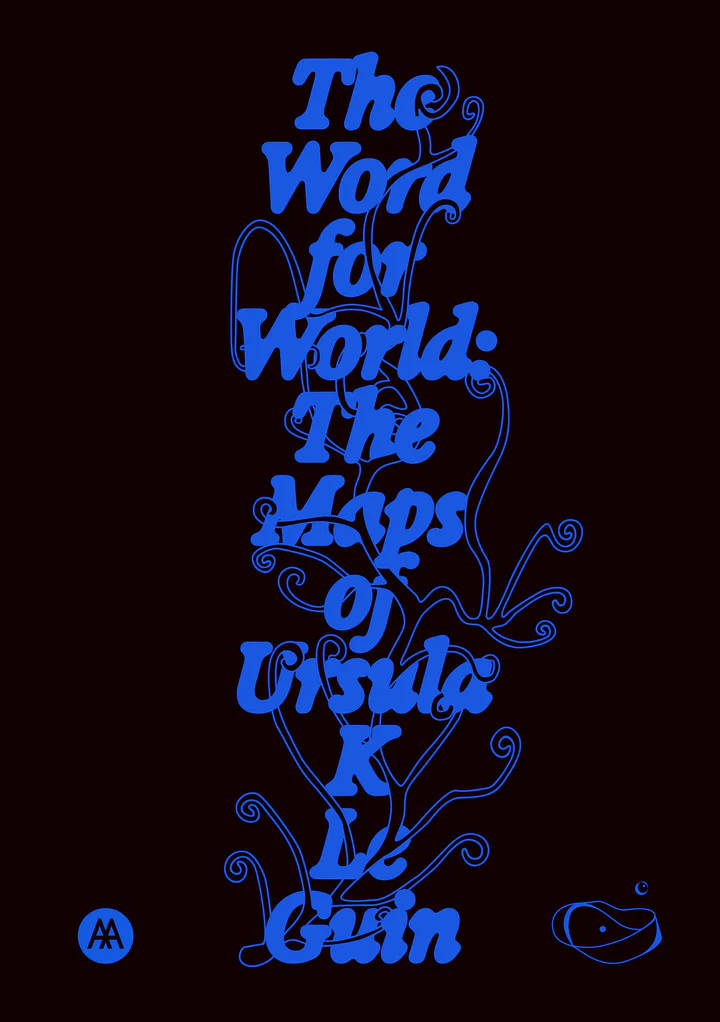
The Word for World: The Maps of Ursula K. Le Guin
When Ursula K. Le Guin started writing a new story, she would begin by drawing a map. The Word for World presents a selection of these images by the celebrated author, many of which have never been published before, to consider how her imaginary worlds enable us to re-envision our own.
Le Guin’s maps offer journeys of consciousness beyond conventional cartography, from the Rorschach-like archipelagos of Earthsea to the talismanic maps of Always Coming Home. Rather than remaining within known terrain, they open up paradigms of knowledge, exemplified by the map’s edges and how a map is read, made and re-made, together. The Word for World brings her maps together with poems, stories, interviews, recipes and essays by contributors from a variety of perspectives to enquire into the relationship between worlds and how they are represented and imagined.
Contributors: Federico Campagna, Theo Downes-Le Guin, Daniel Heath Justice, Bhanu Kapil, Canisia Lubrin, Una McCormack, David Naimon, Nisha Ramayya, Shoshone Collective, Standard Deviation, Marilyn Strathern.
Co-published by Spiral House and AA Publications to coincide with an exhibition of Ursula K. Le Guin’s maps at the Architectural Association, London, opening on 10 October 2025.
”One of the literary greats of the 20th century.” Margaret Atwood
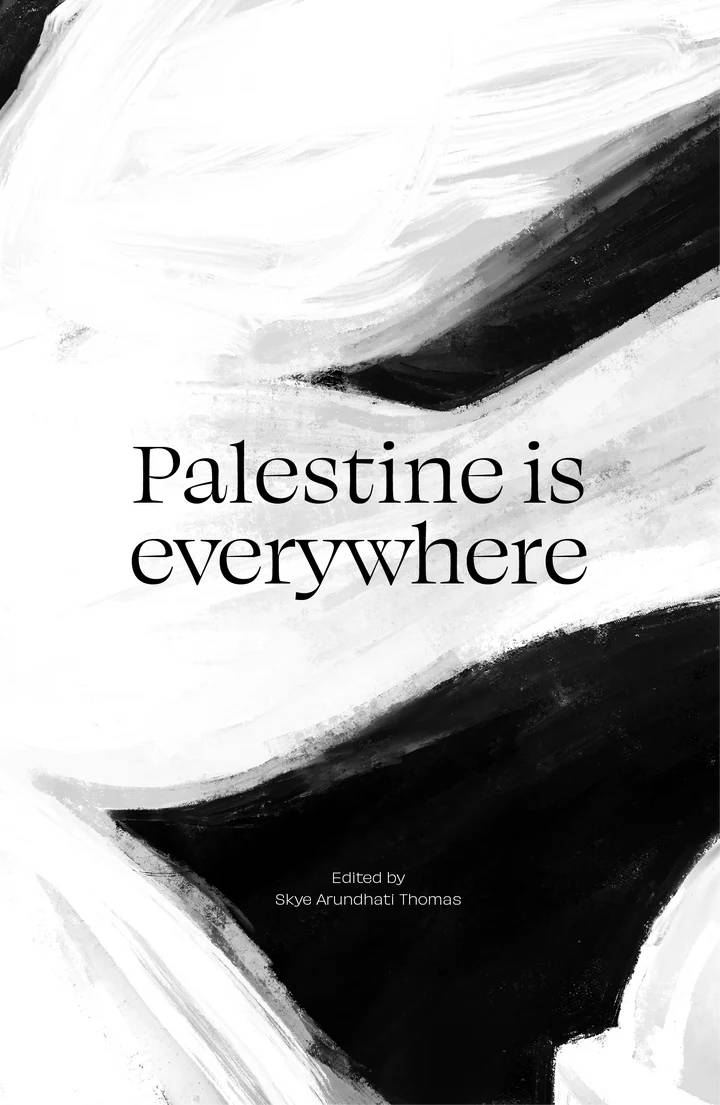
Palestine is everywhere
‘Palestine is everywhere because it names a political subject of radical universal emancipation,’ writes teacher and writer Nasser Abourahme. In Palestine is everywhere, writers, thinkers, poets and artists map the Palestinian struggle for freedom and its global resonances.
Vital dispatches from Gaza, essays, poems, protest chronicles, images and letters from prison reflect upon resistance, solidarity and the right to self-determination. Amid a world-historical moment marked by unknowability and loss, this collection offers essential reading for those interested in Palestinian liberation.
This collection is edited by Skye Arundhati Thomas, with contributions from Alaa Abd El-Fattah, Nasser Abourahme, Amal Al-Nakhala, Muhammad Al-Zaqzouq, Maisara Baroud, Ahmed Bassiouny, Houria Bouteldja, Anees Ghanima, Sahar Khalifeh, Laleh Khalili, Lujayn, Mira Mattar, Lina Meruane, Mohammed Mhawish, Nahil Mohana, Rahul Rao, Nasser Rabah, Adam Rouhana, Ahmad Zaghmouri.
Co-published by TBA21.
All royalties from this project will be donated to Medical Aid for Palestinians (MAP) and The Arab Group for the Protection of Nature (APN).
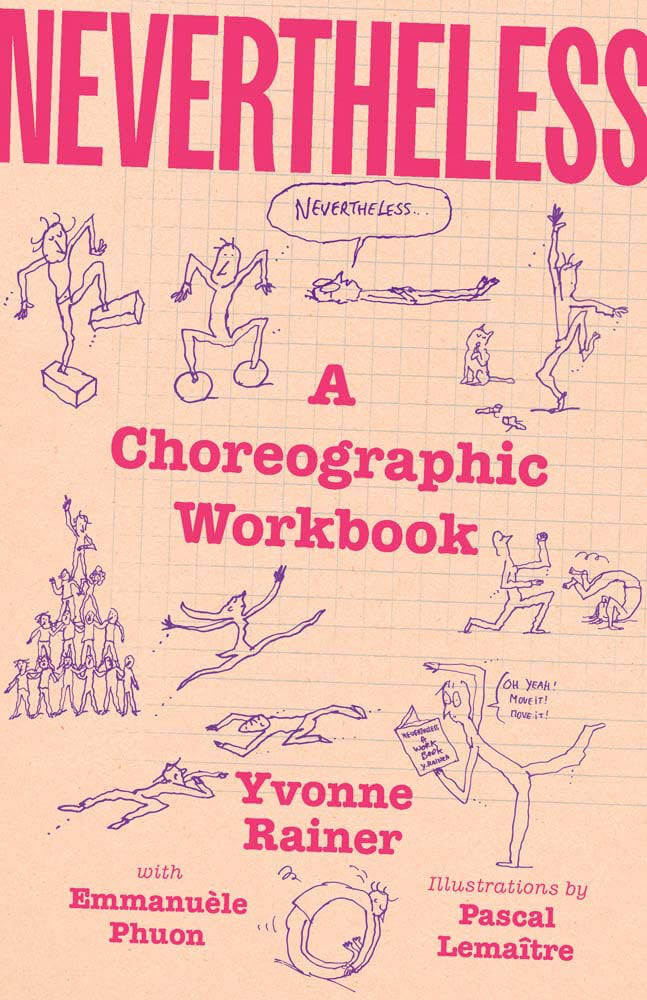
Nevertheless: A Choreographic Workbook
Yvonne Rainer, Emmanuèle Phuon
A legendary choreographer’s personal and practical guide to the art of dance-making.
Yvonne Rainer was a founding member of Judson Dance Theater, a 1960s New York artists’ collective that championed ordinary, spare movements and spontaneity. Rainer’s decades of creativity—in dance and in filmmaking—have inspired generations of avant-garde, political, and feminist choreographers. Her many works include the iconic dance Trio A and the film Hand Movie.
In this book, Rainer dancer and choreographer Emmanuèle Phuon helps Rainer gather teaching notes from her dance classes and workshops, passages from her creative journals, and her newer thoughts on movement and art, opening a window on to the life’s work of a transformative artist. With fifty prompts for improvisational movement (“39. Travel a long distance as fast as you can while making regular changes in your means of locomotion”), sly illustrations by Pascal Lemaître, and an illuminating interview with Phuon, this workbook makes Rainer’s friendly, humorous, and down&-to-earth creative practice available to everyone. Because, as Rainer says, if you can move, you are a dancer.
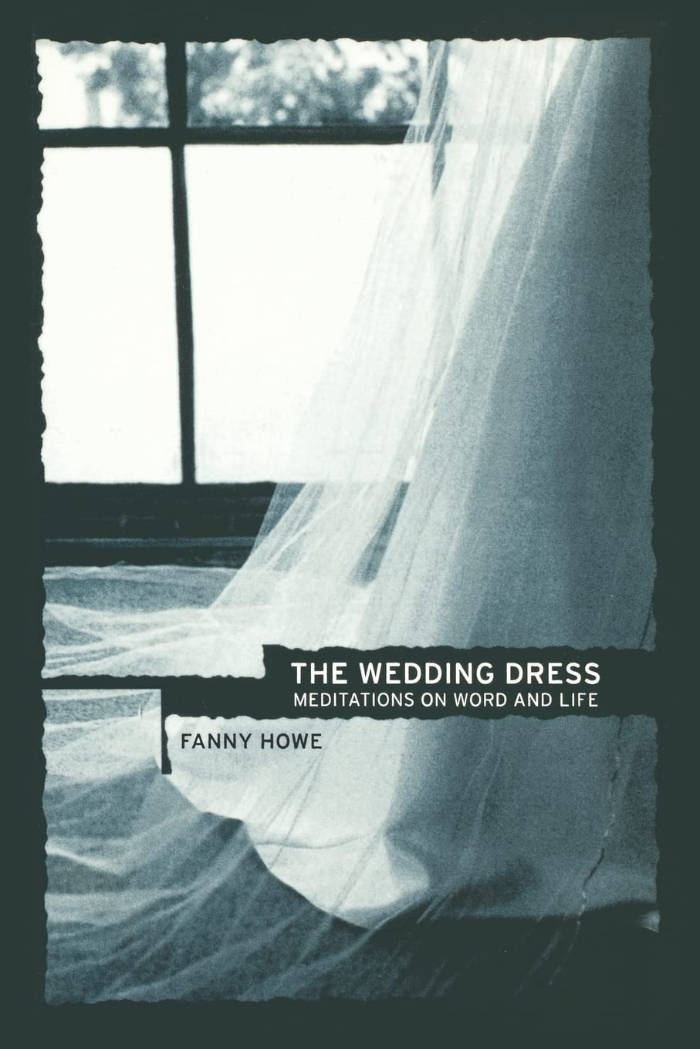
University of California Press
The Wedding Dress
In times of great uncertainty, the urgency of the artist's task is only surpassed by its difficulty. Ours is such a time, and rising to the challenge, novelist and poet Fanny Howe suggests new and fruitful ways of thinking about both the artist's role and the condition of doubt. In these original meditations on bewilderment, motherhood, imagination, and art-making, Howe takes on conventional systems of belief and argues for another, brave way of proceeding. In the essays "Immanence" and "Work and Love" and those on writers such as Carmelite nun Edith Stein, French mystic Simone Weil, Thomas Hardy, and Ilona Karmel—who were particularly affected by political, philosophical, and existential events in the twentieth century—she directly engages questions of race, gender, religion, faith, language, and political thought and, in doing so, expands the field of the literary essay. A richly evocative memoir, "Seeing Is Believing," situates Howe's own domestic and political life in Boston in the late '60s and early '70s within the broader movement for survival and social justice in the face of that city's racism.
Whether discussing Simone Weil, Gertrude Stein, Meister Eckhart, Saint Teresa, Samuel Beckett, or Lady Wilde, Howe writes with consummate authority and grace, turning bewilderment into a lens and a light for finding our way.

The Century of Artists' Books
Johanna Drucker's The Century of Artists' Books is the seminal full-length study of the development of artists' books as a twentieth-century art form. By situating artists' books within the context of mainstream developments in the visual arts, Drucker raises critical and theoretical issues as well as providing a historical overview of the medium. Within its pages, she explores more than two hundred individual books in relation to their structure, form, and conceptualization. This latest edition of the book features a new preface by Drucker and includes an introduction by New York Times senior art critic Holland Cotter.
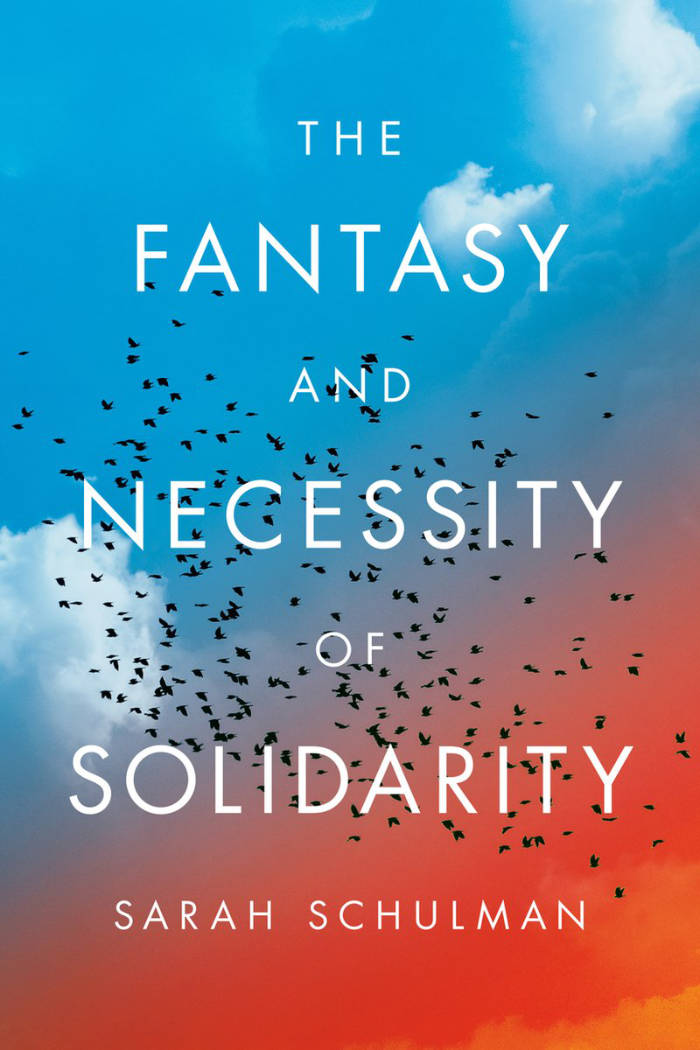
The Fantasy and Necessity of Solidarity
From award-winning writer Sarah Schulman, a longtime social activist and outspoken critic of the Israeli war on Gaza, comes a brilliant examination of the inherent psychological and social challenges to solidarity movements, and what that means for the future.
For those who seek to combat injustice, solidarity with the oppressed is one of the highest ideals, yet it does not come without complication. In this searing yet uplifting book, award-winning writer and cultural critic Sarah Schulman delves into the intricate and often misunderstood concept of solidarity to provide a new vision for what it means to engage in this work—and why it matters.
To grapple with solidarity, Schulman writes, we must recognize its inherent fantasies. Those being oppressed dream of relief, that a bystander will intervene though it may not seem to be in their immediate interest to do so, and that the oppressor will be called out and punished. Those standing in solidarity with the oppressed are occluded by a different fantasy: that their intervention is effective, that it will not cost them, and that they will be rewarded with friendship and thanks. Neither is always the case, and yet in order to realize our full potential as human beings in relation with others, we must continue to pursue action towards these shared goals.
Within this framework, Schulman examines a range of case studies, from the fight for abortion rights in post-Franco Spain, to NYC’s AIDS activism in the 1990s, to the current wave of campus protest movements against Israel’s war on Gaza, and her own experience growing up as a queer female artist in male dominated culture industries. Drawing parallels between queer, Palestinian, feminist, and artistic struggles for justice, Schulman challenges the traditional notion of solidarity as a simple union of equals, arguing that in today’s world of globalized power structures, true solidarity requires the collaboration of bystanders and conflicted perpetrators with the excluded and oppressed. That action comes at a cost, and is not always effective. And yet without it we sentence ourselves to a world without progressive change towards visions of liberation.
By turns challenging, inspiring, pragmatic, and poetic, The Fantasy and Necessity of Solidarity provides a much-needed path for how we can work together to create a more just, more equitable present and future.

Parapraxis 06: Resistance
In 1911, Sigmund Freud addressed his followers gathered at Nuremberg, where he restated the import of his practice: “the task of psychoanalysis lies not at all in the discovering of complexes, but in the dissolving of resistances.” A formal antipode to political resistance, psychoanalytic resistance dams up desire and obstructs traumatic knowledge. It is conservative, allergic to change, and aims for the kind of frictionless normativity against which the unconscious drives rail. Meanwhile, we associate political resistance with change itself, with a blockade that pushes for revolution—rather than a blockage that censors its very possibility. If we read Freud as urging his followers to help their patients move through their resistance, psychoanalysis is a project on the side of material and political reality by bringing patients out of isolation and into social struggles. However, psychoanalysis is often glossed in reverse: as a project of isolated relief for the stubborn individual.
Should psychoanalysis only succeed at rendering patients compliant in their cure? Is psychoanalysis a tool for nullifying political resistance? If so, Freud’s edict for the aim of psychoanalysis is now but an epitaph. It would be easy, then, to give up the ghost, to let psychoanalysis go. But why should psychoanalysis retreat from collective symptoms back into the consulting room for individual treatment—away from strikes, riots, and uprisings, and toward complacency and normativity, if not quite literally marriage and babies? Why should the clinic not dare to be in and of the world?
Feeling restless. Hunger tactics. Laughing in the face of fascism. Breaking through. Diagnosing revolution. Madness in the Maghreb. Essays by Fady Joudah, Jamieson Webster, Dylan Saba, Yasmin El-Rifae, Ussama Makdisi, Mary Turfah, Hannah Proctor, and more.
In Memory of Joshua Clover (1962-2025).

The Palestine Issue (Newsprint fundraiser)
"We release this special issue as one collective voice within the call for abolition, transformation, and exit.
Rather than evacuating our consulting rooms and classrooms of politics, we here seek to put the center of the world at the center of psychoanalysis.
All the proceeds of this issue will go to The Gaza Community Mental Health Programme, where trying to understand and helping the victims of this ongoing catastrophe go hand-in-hand."
Table of Contents The Editors, "“For Life’s Sake”
Nadia Bou Ali, “Social Hell”
Mary Turfah, “Israel’s Reality Principle”
Adam HajYahia, “The Principle of Return”
Rana Issa, “The Right to Exist”
Nihal El Aasar, “Left-wing Melancholia”
Jake Romm, “Elements of Anti-Semitism”
Tad Delay, “Evangelical Zionism”
David Markus, “Persecution Terminable and Interminable”
Kaleem Hawa, “Like a Bag Trying to Empty”
Evan Goldstein, “Freud’s Jewish Closet”
Donald Moss, “On Representations of Evil”
Lama Khouri, “Is This a Dream or for Real?”
Yasmin El-Rifae, “To Know What They Know”
Nadia Bou Ali, “Ugly Enjoyment”
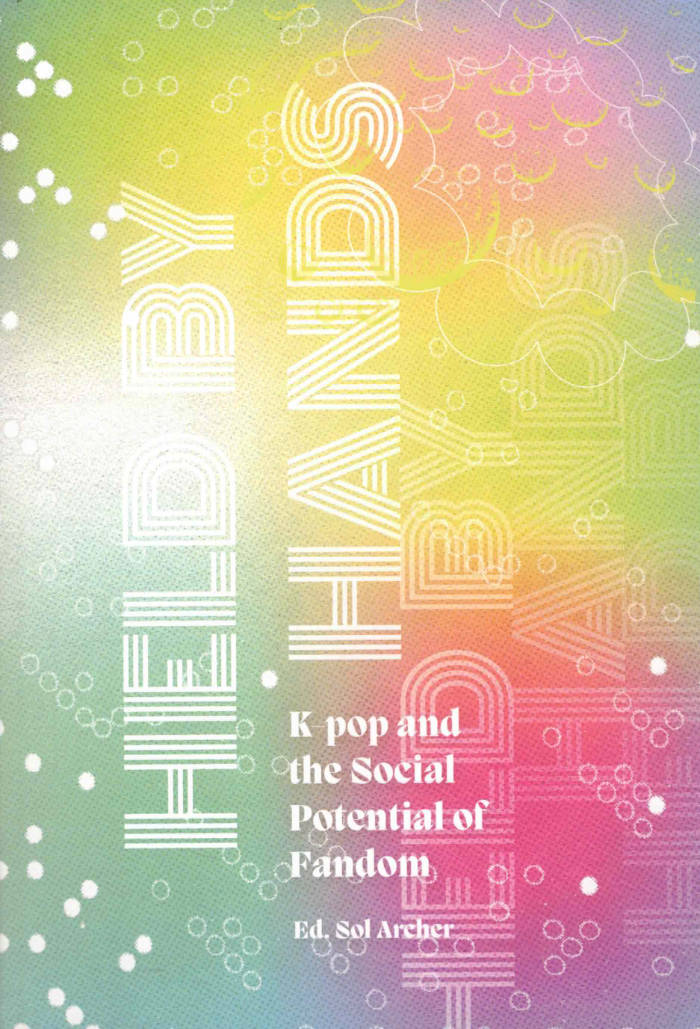
Held by Hands: K-pop and the Social Potencial of Fandom
This book brings together personal and theoretical reflections written by members of the Brazilian K-pop community on the constructive potential of fandom in contemporary society. The texts spans experiences of occupying public space through collective dance practice, identity formation and community support, cultural appropriation in K-pop, the e ects of soft power, and considerations of the phenomenon of fandom
In the fandom universe passive consumption of culture is replaced by active participation in its co-creation. Fan-fiction is one among many examples of this. Autonomous territories, with con gurations and laws unto themselves, are built by fans experiencing culture in collectivised ways. The sense of belonging and formation of identities enabled by exchanges and diverse practices make the K-pop fandom a space with the potential for radical social transformation and collective agency, resisting contradictions inherent to contemporary social norms. This book is a collective body dancing utopia.
With contributions by Aline Barbosa, EVE, Julia Guerreiro, Kananda Simonetti, Kelly Nobre, Lohaynne Beringui, Lucas Victor Aureliano, Marcelle Belfort, Millah C. S. Gomes, Natália Amorim, Paula Castro, Paulina Yeal Cho e/and Sabrina Diniz.

Why I Failed in Porn
This book follows my journey of launching, growing, and ultimately failing in the adult entertainment industry. It explores society’s complex relationship with porn and sex education, the challenges of entrepreneurship, and the struggles of working in a deeply stigmatized space. Sometimes funny, often dramatic, and always surprising, it offers an unfiltered look at the business side of porn and what it really takes to challenge the status quo.
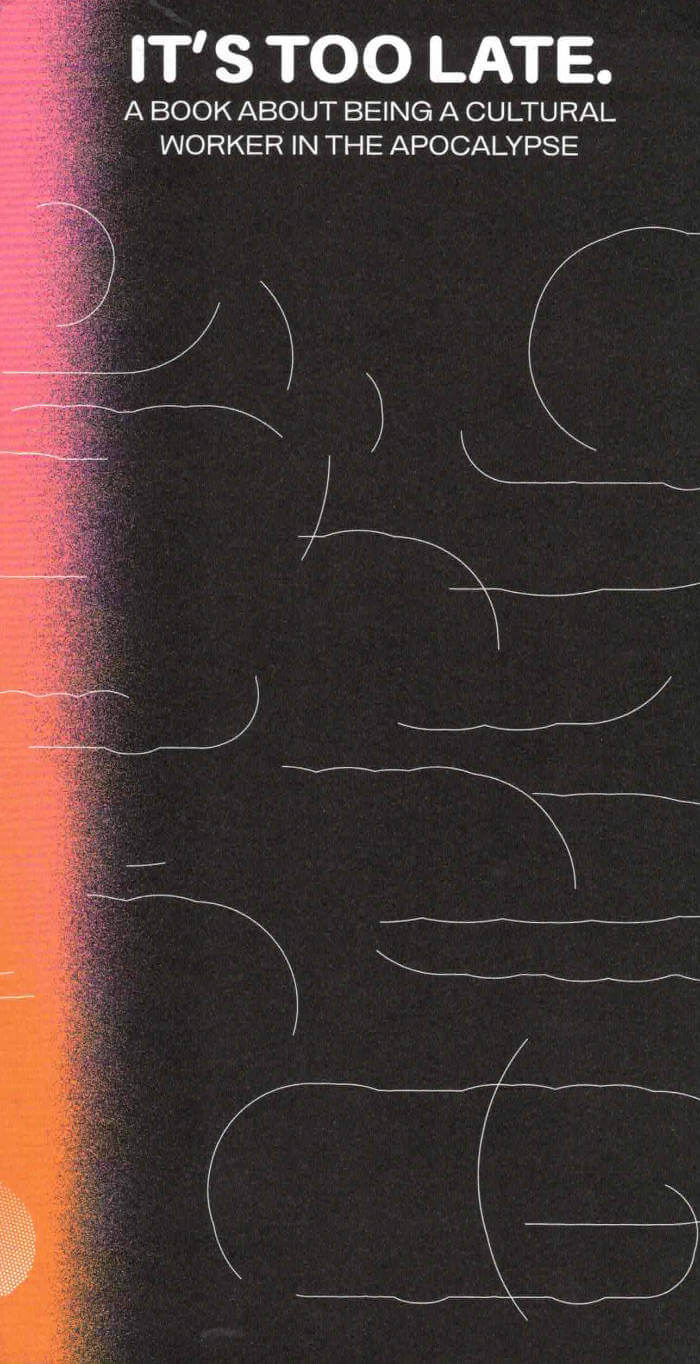
It's Too Late. Do It Anyway!
Cassie Thornton, Magdalena Jadwiga Härtelova
Hey culture worker! Are you feeling alone and afraid while the world burns? It’s Too Late. Do It Anyway! is two books in one, created for cultural workers who want to get off the racial capitalist high-speed-train-to-nowhere and start structuring revolution through collective care.
It’s Too Late. Do It Anyway! offers two routes into a fractal support network designed to shed absurd, useless forms of artworld prestige in favor of collectively producing a world organized to support caregivers. It’s Too Late tells the true story of an exhibition about care that exposed the difference between making symbolic gestures and actually doing something. Do It Anyway! serves as a manual for The Hologram, a prism-shaped collective care protocol conceptualized by artist Cassie Thornton, inspired by the Social Solidarity Clinic of Thessaloniki in Greece, and now practiced by people all over the world.
In It’s Too Late. Do It Anyway! multiple voices weave The Hologram into the present, the past, and the future all at once, ultimately putting the story and the tools it describes into each reader’s life-wizened hands. This is not really a book; it’s a pathway out of the tough spot we are all in right now. Anyone can make use of it, even you.

Hermaphrodite Logic: A History of Intersex Liberationv
How the intersex liberation movement exposed medical harms and became an inspiration to rethink sex and gender.
Hermaphrodite Logic is a bold examination of intersex liberation. Juliana Gleeson reveals how a movement challenged systemic medical abuses to reshape our understanding of sex. Blending philosophical insights and personal testimonies, Gleeson argues that intersex people have been harmed not just for therapeutic reasons but to ease professional and parental anxieties.
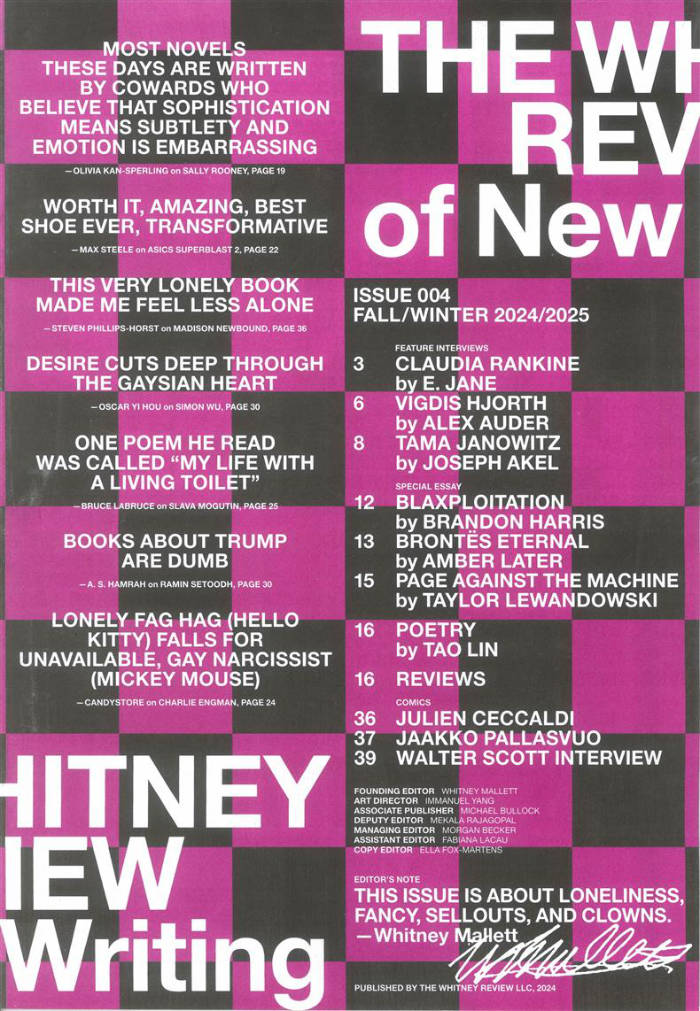
The Whitney Review Issue 4
Interviews with Claudia Rankine, Vigdis Hjorth, Tama Janowitz, and Walter K. Scott. Essays on Blaxploitation, the Brontë sisters, and Kevin Killian's Amazon reviews. Plus comics, poetry, and The Whitney Review's signature chorus of short-format reviews.
Contributors include A. S. Hamrah, E. Jane, Bruce LaBruce, Oscar yi Hou, Alex Auder, Olivia Kan-Sperling, Tao Lin, Amber Later, Brad Phillips, Brandon Harris, Nicolaia Rips, Julien Ceccaldi, Linda Simpson, Michael Bullock, Jaakko Pallasvuo, Geoffrey Mak, Joseph Akel, Candystore, Taylor Lewandowski, Max Battle, and many more.
Abolish Rent, fag/hag, Dear Dickhead, Tweakerworld, and Napalm in the Heart are among the books reviewed. Steven Phillips-Horst skewers c* ns* r*d instagram captions. Max Steele asks can masochism be gentrified? Published biannually, The Whitney Review of New Writing is a bold expansion of literary criticism. The fourth issue is about clowns, sell-outs, loneliness, and fancy.